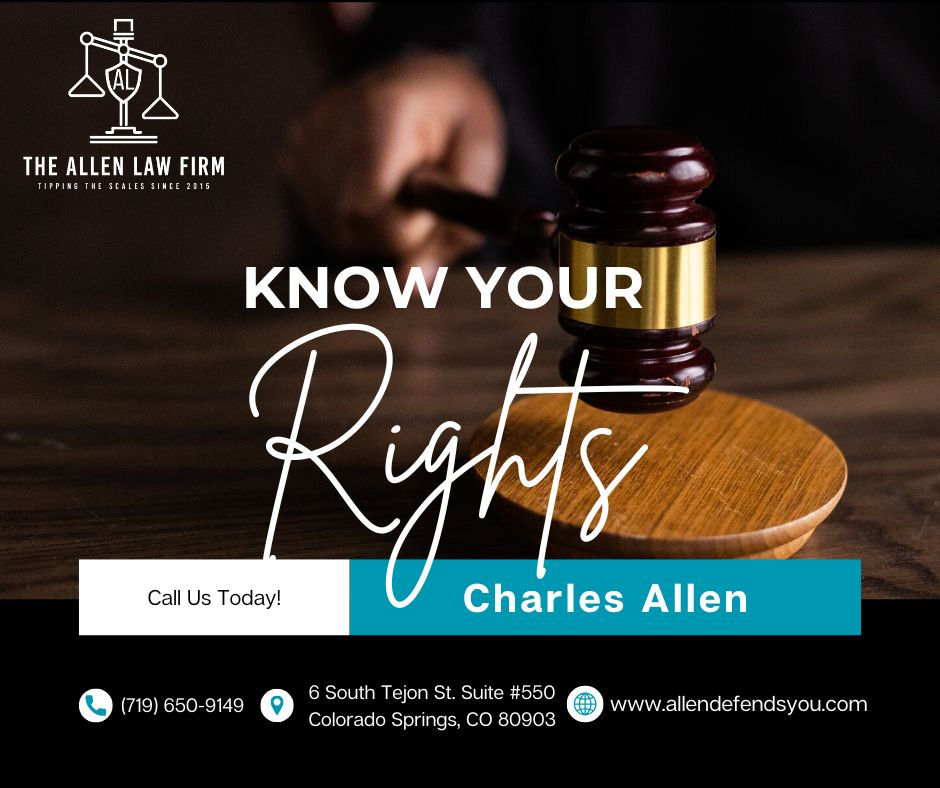What Should I Say If a Police Officer Questions Me in Colorado?
- allendefendsyou
- Aug 3, 2025
- 4 min read
What Should I Say When an Officer Questions Me?
(And Will Staying Silent Make Things Worse?)
By Charles Allen, Criminal Defense Attorney – The Allen Law Firm

If you’ve ever been pulled over, stopped by police, or questioned during an investigation, you’ve probably asked yourself:
“Do I have to answer their questions?” “Won’t it look suspicious if I stay silent?” “Won’t the officer get mad if I don’t cooperate?”
These are real concerns—and I hear them from clients all the time. The truth is, many people talk themselves into criminal charges simply because they didn’t know their rights or were afraid to use them.
So let’s clear up the confusion and talk about what you should (and shouldn’t) say when you’re being questioned by law enforcement in Colorado.
You Have the Right to Remain Silent—Use It
The Fifth Amendment of the U.S. Constitution gives you the right to remain silent and avoid self-incrimination. That means you are never required to answer police questions about what you did, where you’ve been, or what you know.
This applies:
During a traffic stop
At your home
On the street
After you’ve been arrested
Even before you’ve been charged
You can—and should—say something simple like:
“I’m invoking my right to remain silent and would like to speak with a lawyer.”
Once you say this clearly, stop talking. Anything you say after that point can and will be used against you.
“Won’t I Look Guilty if I Don’t Talk?”
This is the number one reason people give in to questioning—and it’s also the most dangerous.
Police are trained to act friendly, build rapport, and keep you talking. But make no mistake: they are not talking to help you—they are gathering evidence.
Staying silent does not make you look guilty. It makes you look smart.
If you end up in court, your silence cannot legally be used against you. But anything you say voluntarily, even offhand remarks, can and will be used as part of the case against you.
What About If I’m Innocent?
Even innocent people can say things that are misunderstood, misquoted, or taken out of context. You might admit to being at the scene without realizing that alone could link you to a crime. You might say you "had a few drinks" without realizing you're admitting to potential DUI.
I've had clients who were completely innocent but talked themselves into trouble by trying to explain their way out of a situation. The police are not obligated to believe you or help you clarify your story.
If you're innocent, your best move is still this:
“I'm happy to cooperate after I’ve spoken with my lawyer.”
Can I Be Arrested Just for Not Talking?
In most situations, no. You cannot be arrested for refusing to answer questions. However, in Colorado:
You must identify yourself if an officer has reasonable suspicion that you're involved in a crime (this is called a "stop and identify" statute).
If you're driving, you must provide your license, registration, and proof of insurance.
Beyond that, you don’t have to answer where you were, what you were doing, or who you were with.
If you're unsure, ask:
“Am I being detained, or am I free to go?”
If they say you’re free to go—go. If you’re being detained or arrested, invoke your rights and remain silent.
What Should I Actually Say?
Here’s a simple script you can remember:
If stopped or questioned:“Am I being detained or am I free to go?”
If the officer says you’re being detained or under arrest:“I’m invoking my right to remain silent. I want to speak with an attorney.”
If pressured to talk:“I respectfully decline to answer questions without legal counsel present.”
Say it calmly. Say it clearly. And stick to it.
Will the Officer Get Mad?
Maybe. Some officers may get frustrated. Some might try to intimidate you into talking. But that’s not your responsibility.
You are not breaking the law by staying silent. You are exercising your constitutional rights. And if an officer tries to punish you for that, it’s their behavior that becomes legally questionable—not yours.
If an officer threatens, pressures, or violates your rights, that’s exactly the kind of thing I can challenge in court later. But I can’t undo a statement you’ve already made.
Final Thoughts from a Defense Attorney
It’s natural to want to defend yourself or “clear things up” in the moment. But when it comes to police questioning, the less you say, the better.
Your job is not to convince the officer of your innocence. Your job is to protect yourself until you can speak to an attorney.
And that’s where I come in.
Contact The Allen Law Firm
If you’ve been questioned, stopped, or arrested in Colorado—don’t wait to get legal advice. The sooner I’m involved, the more I can do to protect you.
📞 Call 719-650-9149📧 Email charles@allendefendsyou.com🌐 www.allendefendsyou.com
Your words matter. Let me help you choose them wisely.




Comments